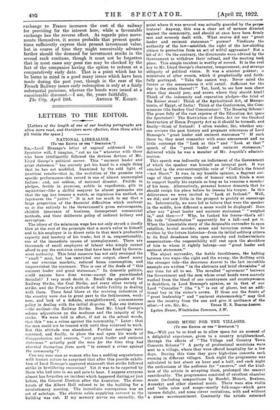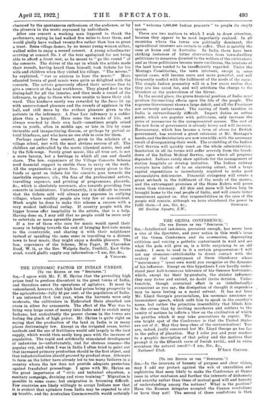GOOD MUSIC FOR THE VILLAGES.
[To MR EDITOR OF TER " SPECTATOR."] SIR, Will you be so kind as to allow space for an account of a delightful experience, given to a country neighbourhood, through the efforts of "The Village and Country Town Concerts Scheme"? A party of professional musicians were sent to a village, where they were offered hospitality for a few days. During this time they gave high-class concerts each. evening in different villages. Each night the programme was calculated to last about an hour and a half, and each night the enthusiasm of the audience for "encores," and the kind- ness of the artists in accepting them, prolonged the concert considerably. The programmes consisted of excellent chamber music (including compositions by Handel, Mozart, Brahms, Arensky) and other classical music. There were also violin and 'cello solos and songs—mostly folk-songs—which gave intense delight, and some clever recitations, with and without a piano accompaniment. Constantly the artists returned
charmed by the spontaneous enthusiasm of the audience, or by tire pleasure in the music expressed by individuals.
After one concert a working man lingered to thank the performers, saying he had walked five miles to hear them, and would gladly have walked twenty-five rather than lose so great a treat. Some village dames, by no means young women either, walked miles to enjoy a second concert. A young schoolmaster arriving at concert No. 1 of the tour apologized for not being able to afford a front seat, as he meant to " go the round " of the concerts. The driver of the car in which the artists made their rounds, having heard them himself, took tickets for his wife and children when they visited his village. " The missus," ho explained, " was so anxious to hear the music." More educated lovers of good music were quite as delighted with the concerts. The artists generously offered their services free to give a concert at the local workhouse. They played first in the dining-hall for all the inmates, and then made a round of the infirmary, to play to those who were unable to leave their sick ward. This kindness surely was rewarded by the faces lit up with unaccustomed pleasure and the rounds of applause in the hall, and still more by the evident pleasure given to the patients in the infirmary. A Poor Law infirmary is a sadder place than a hospital. Here come the wrecks of life, not always wrecked by their own fault—sometimes people seized even in youth, often in middle age, or late in life by some incurable and incapacitating disease, or perhaps by partial or total blindness, and who have no one able to care for them.
Perhaps another free concert, given to the scholars of a village school, met with the most obvious success of all. Tho children sat enthralled by the music (classical music, too) and by the folk-songs. Surely great music, like all true art, is not a mere luxury, but a heritage in which all can and should share. The lion. organizers of the Village Concerts Scheme need financial support to enable them to carry on the work. All the organization is given free. Every penny given to the funds or spent on tickets for the concerts goes towards the inevitable expenses; viz., the fees of the professional artists, travelling expenses, and printing of programmes, placards, &c., which is absolutely necessary, also towards providing free concerts in institutions. Unfortunately, it is difficult to insure that the tickets sold will always pay expenses in outlying villages, where wealthy people are very few or non-existent. Much might be done to make this scheme a success with a very modest individual outlay. If country people with the bigger houses offer hospitality to the artists, that is a help. Having done so, I may add that no people could be more easy to• entertain or more agreeable guests.
If a few of those who care for music would spend their money in helping towards the cost of bringing first-rate music to the countryside, and sharing it with their neighbours instead of spending the same sums in travelling to a distant town to hear music, they might enjoy a double pleasure. The hon. organizers of the Scheme, Miss Paget, 20 Clarendon Road, W. 11, or the Rev. Walpole Sealy, Fonthill, East Grin- stead, would gladly supply any information.—I am, Sir, &c., A VILLAGER.



































 Previous page
Previous page